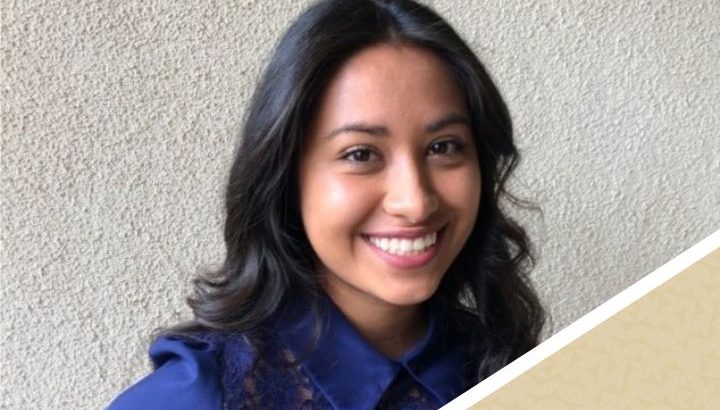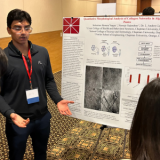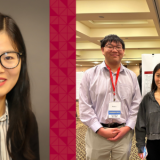
Chapman Alumnus Spearheads Latinx Involvement on Campus and Beyond: Meet Fowler School of Engineering’s Newest Staff
October 12, 2023
Staff Name: Camila Correa
Position: Administrative Coordinator
Alma Mater: Chapman University (B.A. Strategic and Corporate Communication and B.A. English Literature, Rhetoric, and Cultural Studies, ‘20)
Office Location: Swenson Hall, Dean’s Suite N117
As we near the end of National Hispanic Heritage Month, we commemorate our community members who have made an impact on Chapman’s campus. Through campus involvement, multidisciplinary research, and diversifying engineering fields, Fowler’s Latinx and Hispanic students, faculty, and staff have made it possible for future generations to thrive in an academically intensive environment. One of those contributors who have undoubtedly shaped Fowler’s opportunities for our Latinx and Hispanic students is Camila Correa, Fowler’s new Administrative Coordinator.
Correa is a proud Chapman alumnus who has undertaken various initiatives to support and empower Latinx and Hispanic students on campus. Starting as an Alumni Engagement Coordinator for the Office of Alumni Engagement, Correa worked towards cultivating the Latinx Alumni Association, connecting current students to graduates with similar cultural backgrounds and experiences. After persevering through cultural differences and graduating during a pandemic, Correa has returned to Chapman, not only continuing her unwavering support for our students but also sharing her resilience and wisdom from the past few years since graduating from the School of Communication and Wilkinson College.
Q&A with Camila Correa:
Q: What led you to work for Fowler School of Engineering?
Correa: When I got my first job out of college, I was working as a digital marketing specialist for a small family business. Originally, my intention was to go into corporate America. But then I quickly realized that I did not feel motivated in a space that wasn’t giving back to the things and the people that I really cared about.
Then, a position opened up in the alumni department, and I started working there about two years ago. I loved it. I love talking to students and really giving them an idea of what being an alumnus is: the connections and the network that we have, the people they can reach out to if they have any questions like, “how do I get a job?” “Where do I do mock interviews?” “How can I find an alum who’s interested who is working in the medical industry?” I liked being that person that helped connect alumni to each other. Then, I felt like I needed something new.
Now, I’m here in the Fowler School of Engineering, which I love. My best friends graduated from FSE, but I didn’t really spend that much time here. So, automatically, they’re the greatest people alive because they helped my best friends graduate. I want to be able to be a part of that team. I also heard really amazing things about the Fowler Engineering team. When they had this position open up, I was like, “I’m just gonna go for it,” because it’s kind of encompassing all the things that I want to do.
Q: What are some of your responsibilities as an Administrative Coordinator? What do students typically come to you for?
Correa: I’m the first office you see when you walk into the Dean Suite. I’m kind of the one stop before you find the person that you’re looking for. In an unofficial sense, my role is to kind of know everyone, everything that’s going on around them, and to be able to help them with whatever questions they have. Right now, I’m helping with the faculty hiring process, putting up the job postings, communicating with the applicants who we decide to bring in, and those types of logistics to get them in for our faculty and our committee to interview them.
I help Adena Hamlin with all event support, so if she’s putting on an event like Senior Celebration, Commencement, Homecoming, or anything that FSE is hosting or participating in, I’m a part of that team. I’m always going to be there to support and to participate. If student organizations have questions about funding and reserving the spaces here in Swenson, I’m the first person who will read those submissions, and will answer any questions students have, like, “What student clubs are there?” “How can I join?” I can put them in contact with students they can reach out to participate.
Q: How has your identity or cultural upbringing impacted your career or educational journey?
Correa: I think part of my culture and part of my heritage is it’s very communal, and it’s very much a community-based culture. I’m used to having big families, I’m used to creating a family. Knowing all the great things I’ve heard about the Fowler Engineering team, having that as my background helped me become a part of the team here because they’re very much a family and they know they’ve created a community that’s honestly thriving. You can feel it when you walk through the doors in Swenson. I felt like I very much belonged here. I felt like I could contribute, and continue to create that community with this team. Everyone here is never too busy to help. It was very easy to fall into that community and this team, to continue to do that and continue building the community that they’ve already created here.
Q: Who has been your inspiration or role model within this position? What have you learned from them that you have applied to your current responsibilities?
Correa: Well, before I started in this position, Christian Aguilar and Dr. Castañeda were very crucial and helpful in figuring out what I wanted to do with my career, and basically helping me find a job within Chapman, because I wanted to continue working here. But I felt like my path was not in the alumni department. I wanted to grow outside of that.
I really wanted to be involved with students in some capacity and Christian and Dr. Gabby really helped me figure that out. They always gave me really great advice. They’re always looking out for me, and I can pretty much go to them for anything. In this role with my current team, I have to say, I can’t pinpoint one person because everyone has been so helpful and so open and so receptive to me. I love this team for it. I work the most with Adena and Viviana Pérez but I’m still trying to get to know everybody here. I don’t know if there’s one role model or one specific person. But I have to say the whole team – they’re 100% to me, as a whole, and I’m really loving it here with them.
Q: What previous experiences, whether pertaining to your professional or cultural identity, have helped you prepare for this new role?
Correa: When I started here, there wasn’t very much of a sense of community. I was having a hard time communicating and relating to most students who were attending Chapman. So when I did find my community here, it was a little challenging at first because we didn’t have the Latinx Club. We had MEChA [Movimiento Estudiantil Chicano de Aztlán], which was the political group. I’m not really a political person, but there was no other option at the time. I ended up getting two jobs and having five classes, so I did not have the time to go to student club meetings. But I don’t regret it. It was the most fun I had here.
Feeling that disconnection, at first, made me want to transfer to Long Beach State because I had friends who were going there. But I met my best friend here: Samantha Gonzalez. She’s one of the first people who graduated from Fowler Engineering. She was the reason that I stayed because I was like, “Okay, I found one fantastic person, there’s got to be more.” There’s got to be more of us. So I met more of her friends and the people that she had connected with. We just slowly started to build our friendships, our groups, and our community. One of the co-founders of the Latinx group was one of our friends, Alberto Garibay.
When we finally graduated during the pandemic, I wanted to get involved with alumni. I looked for the Latinx Alumni Association, but Chapman did not have one. That became one of my goals. When I first started working in the alumni department, I wanted to establish that organization, that community, because we’re out there and we exist. Since we are community-focused, they want to come back and help the students, and they want to be involved. Eventually, we started the Latinx Alumni Association and its Steering Community.
We’re trying to help with just our own career development. We’re also very social people. The more social events we hold, we have to really bring more alumni in for them to meet each other, which is something that is really important to us. We could just come after work and talk. Building that community, and meeting Christian in that process, and a few other alumni from different grad years, was really eye-opening to me.
I was meant to come to a school that didn’t have that much community, that didn’t have much diversity, and to be an advocate for that. That’s something that’s really important to me. Now, in this role, we’re still trying to get more Hispanic/LatinX students into STEM. While I’m not leading any programs, I still get to be a part of the school that’s helping grow diversity. That’s motivation enough to continue to be an advocate and to know that everyone else here has the same values and the same beliefs as me. But I am so proud of the Hispanic/Latinx students at Chapman who are running the student organizations. I want to give them a huge shout-out for all the hard work they’ve done to create and grow the community.
Q: What advice do you have for Latinx students seeking to successfully transition into a higher education setting or profession?
Correa: My parents always said, “we are oppressed in a different version of history. So it doesn’t look like oppression, but it is, and you have to figure your way out of it. What we need to do to do that is to stick together.” Any time any Latinx or Hispanic person that I know is hired, I’m the first to reach out to them. I think the big thing is not being afraid to put yourself out there because somebody does want to help. If it does take you a while to find that person, that’s okay. They will come eventually, either you find them or they’ll find you. I can’t speak for other institutions, but Chapman, I feel like in my experience so far, everyone is pretty much a community and they want to see you grow. They don’t want you to stay in one place forever. They want to see that you’re growing, that you’re building your skill set, and that you’re pursuing the things that you’re interested in and you’re just wanting the best for each other. Don’t be afraid to put yourself out there. That’s the first and the biggest and the hardest step, putting yourself out there. After that, it’s honestly just a breeze.

